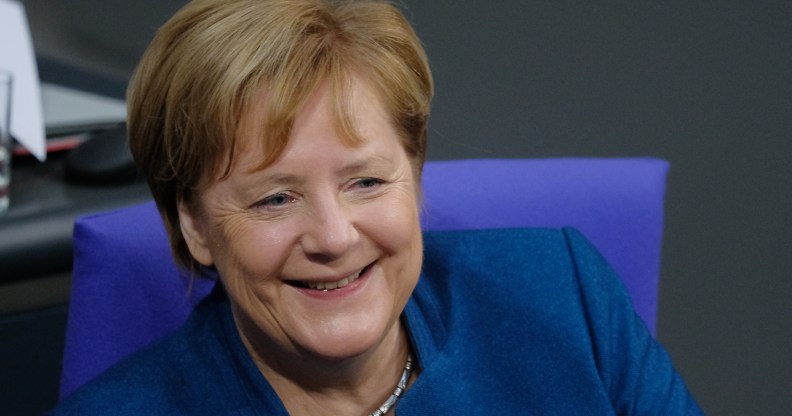German parliament adds third gender to birth certificates

After German Chancellor Angela Merkel’s cabinet approved the changes in August, the parliament has now passed the law (Sean Gallup/Getty)
Germany’s parliament has passed a law which will add a third gender to birth certificates for people born intersex.
The blank option on forms, instituted in Germany in 2013 as a Europe-wide first, will be replaced by a “diverse” option for newborns whose sexual anatomy does not fit the binary male or female, according to The Local Germany and Deutsche Welle.
Intersex people will also be able to change their gender and first name on birth certificates if they feel they were assigned the wrong gender at birth, though this will usually require a medical certificate.
Why has Germany added a third gender?
The changes to the law, passed on Thursday (December 13) by the Bundestag, came after the highest court in the country ruled in favour of an intersex person seeking to add a third gender to official documents in November 2017.
The Federal Constitutional Court ordered that by the end of 2018, the parliament must legally recognise another gender option from birth or remove gender from documents entirely.
This overruled several lower courts who had rejected the intersex person’s case.
In August, Germany’s cabinet, led by Chancellor Angela Merkel, voted to approve plans to add the extra gender option.
LGBT activists say it isn’t enough
Some pro-LGBT campaigners including Greens parliamentary group leader Anton Hofreiter have said that the law doesn’t go far enough.
Hofreiter opposed the need for people to provide a doctor’s certificate before any change could be made to their documents, telling Funke Media Group newspapers that it was “preposterous and a sign of distrust of those who don’t fit into an old-fashioned view of society, especially that of the CDU (Christian Democratic Union of Germany) and CSU (Christian Social Union in Bavaria),” according to Deutsche Welle.
Lesbian and Gay Federation in Germany board member Henny Engels also criticised the new law, as he said it was too focused on physical characteristics.
Engels insisted that “gender is not only defined physical signs, but also by social and psychological factors.”
More conservative lawmakers supported the requirement for a medical document, with CDU politician Marc Henrichmann, who sits in the Bundestag, saying it meant people would not be able to self-identify their gender.
The acting parliamentary group leader of far-right party AfD (Alternative for Germany), Beatrix von Storch, also made her opposition to self-identification clear.
She said: “Which gender you belong to has been an objective fact since the beginning of time — just like age and body measurements.”

